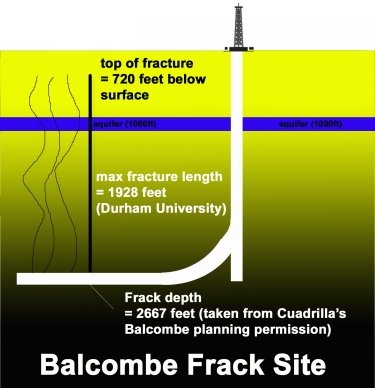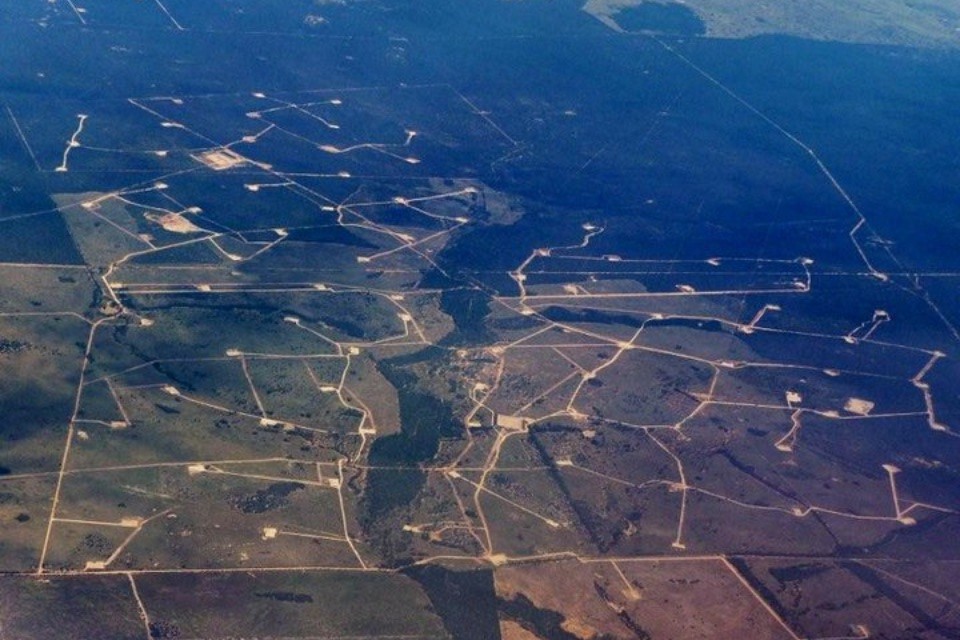Despite causing earthquakes and threatening scarce water supplies, companies are free to perform hydraulic fracturing in the UK, said the Department of Energy and Climate Change (DECC).
Contrary to official and industry announcements, DECC, in an email to Sussex campaigner Vanessa Vine, has revealed that ‘Cuadrilla agreed voluntarily to suspend operations.’
Authorities regularly use the notion of a ‘suspension’ to justify inaction on fracking. Balcombe Parish Council maintained the fiction for several weeks, and more recently West Sussex County Council, despite being clearly informed otherwise, have justified inaction on the spurious basis of a non-existent national suspension.
DECC also detailed the official definition of fracking, and the issuance of licenses nationally. You can read the full text of the email below –
(Vanessa Vine): What is the definition of hydraulic fracturing for shale gas, that is used for the purposes of Government licensing, permission, consent and legislation?
(DECC): The term “hydraulic fracturing” does not occur in DECC licences or in any relevant legislation. It is not possible to give a single exclusive definition of the term as it might be used in consenting activities under the licences, because it covers a range of techniques which are applied in a wide variety of contexts. But in general terms, hydraulic fracturing is a process in which fluid under pressure is pumped into an oil or gas borehole to stimulate production of the hydrocarbon by creating fractures or channels into the petroliferous rock.
In fracking for shale gas, the fluid normally contains small particles of inert material to hold open the fractures and allow the released gas to flow at commercial rates. Although shale exploration is new to the UK, fracking is not a new technique and it has been used both onshore and offshore in the UK in pursuit of low permeability gas and coalbed methane during the last decade or so.
(VV): Does this definition include the exploratory stage – of lesser volume and intensity – which nevertheless involves pressure injection of water, sand and foreign toxins into the subterranean geology?
(DECC): The kind of fracking performed in exploring for shale gas is broadly similar to that expected to be used in production, but is likely to involve fewer stages, and so a smaller total volume of frack fluid. In US practice, a production well is most commonly drilled horizontally, and fracked in a number of stages – the number of stages is normally more than in an exploration well. It is expected that production wells in the UK will likewise have more stages than exploration wells, but the only wells so far drilled in the UK are for exploration.
Any substance that is proposed to be released to groundwater has to be assessed to determine if it is hazardous. The Environment Agency will not authorise the use of hazardous substances for fracking operations.
(VV): How does this legislatory definition differ (if at all) from the process – also involving hydraulic fracturing – currently being used in the UK to extract oil from shale rock and to extract gas (Coal Bed Methane) from coal seams ?
(DECC): The pressures used in fracking for shale gas would be expected to be greater, and the volumes of fluid injected substantially greater, than for coal bed methane.
Has the Department of Energy and Climate Change imposed a suspension on Cuadrilla’s hydraulic fracturing activities at Preese Hall in Lancashire, or has Cuadrilla desisted voluntarily and temporarily?
The Department has powers to suspend activities under the licence where necessary. In this case, Cuadrilla agreed voluntarily to suspend operations.
(VV): Please would you either provide the documentation confirming any such Government suspension, or confirm, explicitly, that no such documentation exists.
(DECC): There is no specific documentation. The company has orally confirmed on numerous occasions its recognition of the effect of the suspension.
(VV): Do Cuadrilla still have permission and all the necessary licenses in order to continue drilling, in preparation for potential subsequent fracking? If so, where are they currently granted such permissions.Preese Hall?Balcombe? Cowden? Lingfield?
(DECC): The petroleum licences convey no permission to conduct operations, which require separate consents from DECC, in addition to planning permission, etc. (see further below). Cuadrilla currently has DECC consent to drilling operations at only three sites, Preese Hall, Hesketh Bank and Grange Hill, all in Lancashire.
(VV): Please answer the same question with regard to all other prospective UK fracking companies, such as Magellan and Coastal Oil & Gas.
(DECC): No other company currently has DECC consent to drill for shale gas.
(VV): You mentioned a commercial fracking license (you thought it was in Lincolnshire) that was granted but subsequently declined by the applying company. Was this License then revoked? Which is the company in question?
(DECC): Europa Oil and Gas was granted consent in Aug 2011 to re-enter a producing well in the Crosby Warren field in Humberside to frac, as the production flow rate in previous wells in the field had been improved by fracking, but their operational plans changed and they no longer wish to frack, so this consent was withdrawn.
(VV): How many sites in the UK currently have all the requisite permissions, licenses and consents in order to go ahead with exploratory fracking?
How many sites in the UK currently have all the requisite permissions,licenses and consents in order to go ahead with commercial scale fracking?
Where, specifically, are these sites? Please would you list them all.
(DECC): There are currently no sites in the UK which have all necessary permissions for fracking, either for exploration or production.
(VV): Or has the DECC suspended all existing licenses to frack (including flow tests/ leak-off tests/ acid washes etc.) for shale gas/oil and coal bed methane in the UK, for example at Cowden in Kent, where Cuadrilla claim to have carried out such a “test frack” in July 2010?
(DECC): No licences have been suspended for any reason connected to shale gas, and no consents have been suspended other than Cuadrilla’s consents for fracking at Preese Hall and Grange Hill.
(VV): What permits, specifically, are required in order for a company to carry out both drilling and fracking?
(DECC):A Petroleum Exploration & Development Licence, planning permission, and a drilling consent from DECC. The drilling consent will where appropriate specify which fracking operations are permitted. The company must also notify the Environment Agency, which may require it to take out one or more permits for certain aspects of the operations; and must notify the HSE, which has powers to stop operations if they are not satisfied with the drilling plans.
(VV): Please would you provide example documentation.
(DECC): There is a document on the DECC site which describes the regulatory steps required to drill a well (which would include any plans to frack)
http://og.decc.gov.uk/media/viewfile.ashx?filetype=4&filepath=og/ep/onshore/3626-onshore-oil-and-gas-exploration-and-development-in.doc&minwidth=true
and a diagram which depicts the steps required to move to production
http://og.decc.gov.uk/media/viewfile.ashx?filetype=4&filepath=og/ep/onshore/3627-slide-describing-regulatory-interaction-onshore-ex.ppt&minwidth=true]
The Environment Agency holds all the permits and consents it issues on public registers. It is possible on-line to examine data, with a facility to request further details and copy documents from their customer contact centre.
http://www.environment-agency.gov.uk/research/library/publicregisters/default.aspx
They also have interactive maps that include details of emissions from larger permitted sites.
http://www.environment-agency.gov.uk/homeandleisure/37793.aspx.
Copies of recent licences can be viewed on the DECC website at http://og.decc.gov.uk/en/olgs/cms/licences/licence_data/recent_licence/recent_licence.aspx and as an example, a copy of the licence for the Balcombe area is attached.
(VV): Will the DECC respond to the Early Day Motion http://www.parliament.uk/edm/2010-12/2292 tabled by Caroline Lucas, sponsored by Jim Dobbin, Mark Durkan, Jonathan Edwards, Glenda Jackson and Michael Meacher – to date signed by 44 MPs and supported by tens of thousands of UK citizens – by declaring a Moratorium on all hydraulic fracturing in the UK (including that used in coal bed methane extraction).
If not, why not?
[DECC officials declined to answer this one]
DECC-LED
8 February 2012










